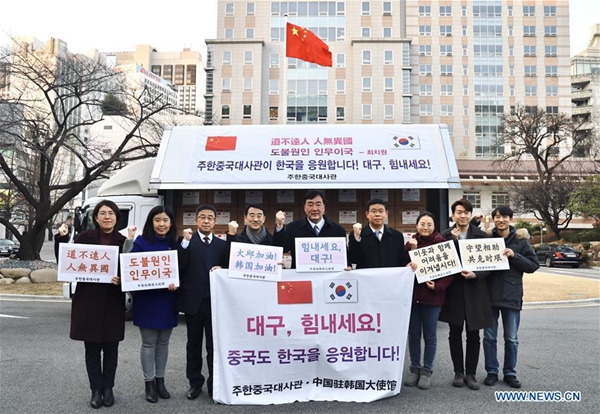
Chinese Ambassador to South Korea Xing Haiming (C) and other members of the embassy cheer up for Daegu, in Seoul, South Korea, Feb. 27, 2020. [Photo/Xinhua]
Fire and rocks were thrown at a bus heading to a quarantine zone carrying Ukrainians from Wuhan. This incident happened on the sixth anniversary of fire and violence at Maidan Square in Kiev.
Since then, Ukrainian politics had a moment of calm. Parts of the country have been engulfed in constant unrest and warfare, as world powers compete for influence in Ukraine.
The riot was touched off by fake news stating that novel coronavirus (COVID-19) cases were already in Ukraine, but that is not the case. Let us dispense with politics for now, because instances of discrimination and even violence associated with fears of COVID-19 have been occurring in countries around the world. The rock-throwing incident was caused by angry and anxious people out of their own volition.
It is not limited to Ukraine. Many purported news outlets are reporting fake or misleading news about the novel coronavirus due to their sloppiness and bias.
In the U.K., for example, a female university student of Asian descent was verbally attacked for wearing a mask. Weeks ago in South Korea, shops began putting up signs saying "No Chinese." The U.S. and Australia banned almost all travel from China. There were scattered reports of Americans demanding that an ethnic Chinese performance troupe be banned from taking the stage in Salt Lake City.
But by far the Ukraine incident was the worst to happen yet.
Many bloggers pointed to fake and mislabeled videos to lie and exaggerate what was happening. American senator Tom Cotton even suggested that biological weapons were behind the virus.
Bloggers and tabloid reporters frequently sensationalize news just to get views and money. Politicians sensationalize for votes.
COVID-19 is a difficult situation, and it is getting worse in some countries. In South Korea, the virus has been spreading quickly, surpassing 1,200 cases. It has also been spreading in parts of the Middle East and Europe.
People should be concerned. The disease is much worse than the flu; however, it is not as deadly as SARS, and it is not a horror flick. As with most things, the proper response is moderation, somewhere in between the two extremes.
Fake news and panic only make the problem worse. Tragically, someone in India killed himself when he got sick and thought he had the disease. It makes people take drastic actions, and it inhibits cooperation.
Cooperative measures are necessary, as the latest increase in cases across the world shows that this is a global problem. Cooperation in the form of sharing resources and expertise and working together to find a wonder drug would help solve the problem more quickly.
Mitchell Blatt is a columnist with China.org.cn. For more information please visit:
http://www.china.org.cn/opinion/MitchellBlatt.htm
Opinion articles reflect the views of their authors, not necessarily those of China.org.cn.
If you would like to contribute, please contact us at opinion@china.org.cn.




